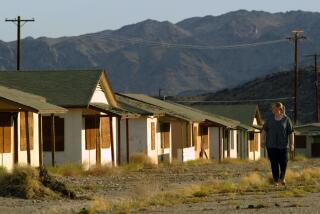Eagle Creek’s Sales of Travel Gear Soar Despite Indicators : Luggage: The San Marcos manufacturer has grown up with the Baby Boomers it first supplied with backpacks. Now it provides them with lightweight luggage.
- Share via
Common sense dictates that the Persian Gulf War, ever-rising airline fares and the continuing recession would dampen sales during the past year for Eagle Creek, a San Marcos-based manufacturer of travel gear.
Yet, despite those negative factors, Eagle Creek expects revenue to increase by about 15% to slightly more than $10 million during 1991. Although that increase is relatively healthy, Eagle Creek in recent years has averaged sales increases in the 30% to 40% range.
“It’s been an interesting year,” said Steve Barker, the firm’s founder and president. “The year has been disappointing to us, but we’re expecting a rebound in 1992. . . . This has always been a pretty resilient business.”
Despite bad economic news, the market for travel gear--lightweight but tough luggage and related accessories--has bounced back strongly in recent months, with July generating the company’s best-ever sales total, Barker said.
Barker also expects sales to continue to increase during the coming decade, as Americans, weary of the status-conscious 1980s, return their focus to products that “have function and value.”
Eagle Creek, which first offered only backpacks and related mountain-climbing equipment, since has expanded its product line to include what Barker describes as “adventure gear.”
Retailers who sell Eagle Creek products describe the bags and accessories as being designed for “serious travelers who want functional and durable products rather than products that merely look good.
“They’ve got a complete line of accessories for the adventure traveler,” said Deborah Whitsell, an associate buyer with REI, a Kent, Wash.-based company that operates a nationwide string of outdoor equipment retail stores. “And they’ve generally got the best product in each of those niches.”
Besides a wide variety of backpacks and duffel bags, Eagle Creek’s plants in San Marcos and Ensenada turn out soft-sided suitcases and travel packs, money belts, neck pouches, a diaper-changing bag and a “pooch” pack that hikers can strap onto a dog. The company also offers an “everyday” travel bag, a variety of wardrobe bags and a “security holster” that holds passports and wallets.
Travelers appreciate Eagle Creek’s attempts to provide functional products.
“Every time there’s a little Baby Boom we end up selling lots of those (diaper bags),” Whitsell said. “There are compartments for diapers, bottles and everything else . . . and since they don’t come in dorky floral patters, even guys are happy to use them.”
Eagle Creek’s executives have developed reputations as “good businessmen who are fair, and who do their job well,” said Bob Bury, REI’s luggage and travel buyer. “They know their market well.”
Eagle Creek’s market is “the Baby Boomers, pure and simple,” Barker said. “We began with the Baby Boomers, and we stuck with them . . . which has turned out to be a good decision.”
The company, which began selling a relatively limited line of highly functional and extremely durable backpacking gear, correctly guessed during the 1980s that its generally upscale customers eventually would demand those same qualities in a broader array of travel-related items.
“We created a niche, and we’re marketing heavily to that niche,” Barker said. “I guess you can say we’d like to be the Samsonite of the travel gear business.”
Eagle Creek, which has 65 employees in its 40,000-square-foot plant in San Marcos, opened a maquiladora plant in Ensenada in 1984.
The 20,000-square-foot Ensenada plant’s 190 employees, along with 75 other employees at smaller shops elsewhere in Baja California, sew the bags and accessories that are designed and cut in the San Marcos facility. Eagle Creek uses trucks to transport goods and finished product between the two countries.
Barker said the company has remained competitive because of its Mexican operations. Eagle Creek has linked up with a lower-cost labor force “that allows us to compete globally . . . with factories in the Orient, which are our main competitors.”
Before opening the Mexican assembly operation, Eagle Creek found itself “stripping our products of labor-intensive” features in order to compete with lower-cost competitors in the Orient, Barker said.
But the company now uses Mexico’s lower-cost labor force to “add extra values” that its customers clamor for, Barker said.
Although Eagle Creek sells mainly products bearing its own name, the company also manufactures a limited line of “private label” products for the Eddie Bauer and L.L. Bean companies.
Eagle Creek now is attempting to duplicate its “boomer” market in Europe.
The company recently began selling its products in German outdoor equipment shops and French department stores. Europeans “want (bona fide) American products, especially from the American West,” Barker said. “They know we’re at the forefront of outdoor equipment design.”
But European Baby Boomers aren’t simply interested in anything with the American label. Like their American counterparts, they are demanding functional products that are a good value, Barker said.
Foreign sales, largely in Europe, now account for about 10% of the company’s overall sales. The figure is expected to rise gradually because overseas sales only began in earnest this spring, Barker said.
More to Read
Inside the business of entertainment
The Wide Shot brings you news, analysis and insights on everything from streaming wars to production — and what it all means for the future.
You may occasionally receive promotional content from the Los Angeles Times.








